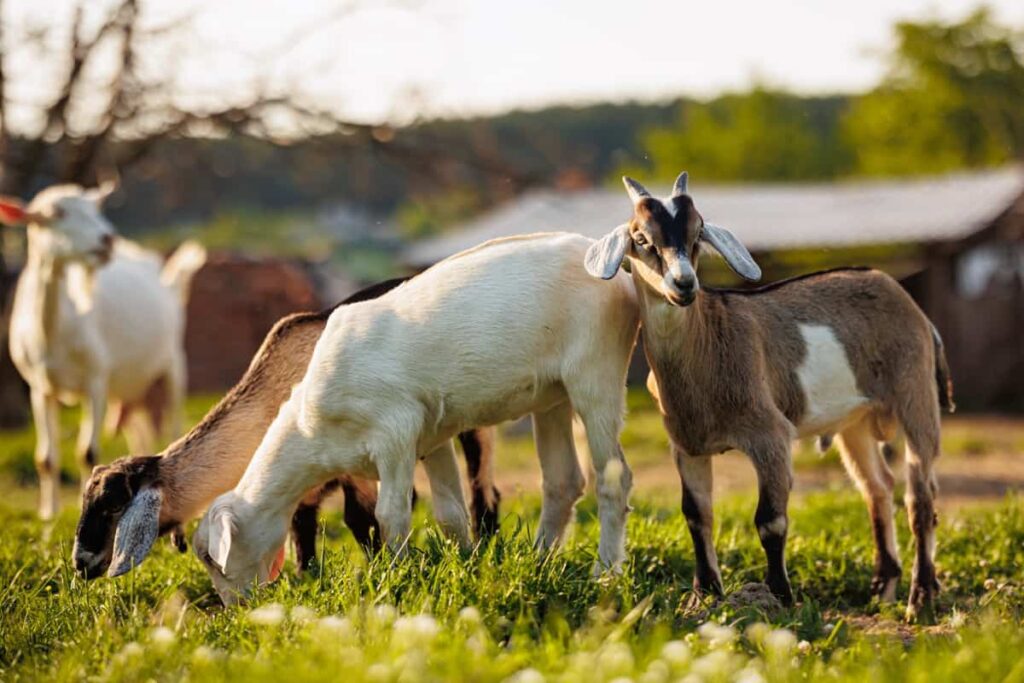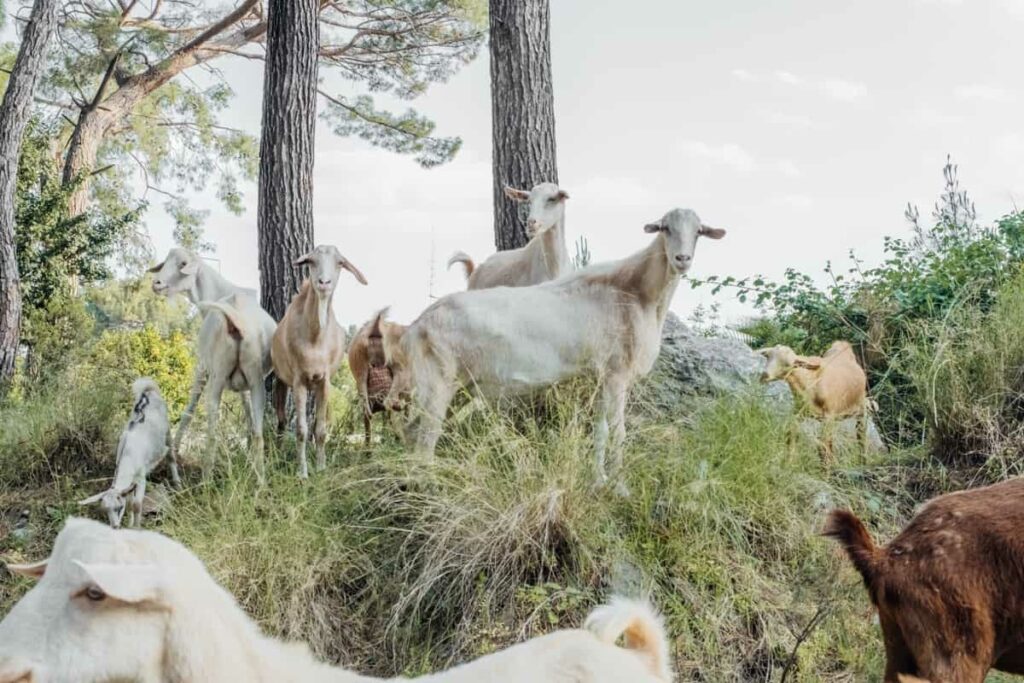Goats are low-maintenance animals, making them ideal for small farmers and those with limited resources. They require minimal space and can be fed on various food sources, including grass, shrubs, and leaves. The demand for goat meat, milk, and other products constantly increases in the country, making this industry very lucrative.

Is Goat Farming Profitable in Sri Lanka?
Due to its profitability, goat farming has become a popular livestock business in Sri Lanka. It can be highly profitable if you approach it with the right strategy. Sri Lanka has a goat meat population of about 534,000. The highest concentration of goats is found in the dry and dry intermediate zones.
The Different Breeds of Goats in Sri Lanka
- Goat farming is a common practice in Sri Lanka, and most goats reared here are local or indigenous breeds. These goats have adapted to the tropical climate of Sri Lanka and are well-suited to survive in this environment.
- However, many farmers have also started crossbreeding these indigenous goats with improved breeds such as Jamunapari, Saneen, Beetal, Boer, Kottukachchiya, and German Boer. This has resulted in higher milk production and better meat quality.
Necessary Equipment for a Successful Goat Farming in Sri Lanka
- Housing – You need a suitable housing facility for your goats. The house must be strong to withstand harsh weather conditions and protect goats from predators.
- Feeding and watering equipment – Goats require fresh water daily and proper feeding throughout their growth stages. Therefore, ensure that buckets, automatic waterers, and feeders are installed around the farm.
- Fencing – Adequate fencing is essential to keep your goats safe within their designated space on the farm while also keeping predators out.
- Milking machine – If you plan to sell milk products, investing in a machine that requires less labor than hand milking is crucial.
- Hoof trimmers – Maintaining good hoof health by trimming hooves regularly with good-quality trimmers is important.
- Health care equipment – This includes vaccines, medication stockpiles such as antibiotics and antiparasitic drugs, syringes, etc.; these items will help manage any illness or disease symptoms among your herd before contacting veterinary services.
Management Strategies for Goat Farms
- Managing a goat farm requires careful planning and organization to ensure the success of your goat farm business. The most important management strategy is maintaining a clean environment for your goats. This includes regularly cleaning their living spaces, providing fresh water, and feeding them nutritious food.
- Another key strategy is to keep accurate records of your goats’ health, breeding cycles, vaccinations, and other important information. This will help you make decisions about herd care and track their progress over time.
- It’s essential to have a marketing plan for selling your goats or their products, such as milk or meat. Effective management strategies are critical for running a successful goat farming business in Sri Lanka.
In case you missed it: Goat Breeding and Genetics for Improved Productivity and Disease Resistance

How to Care for Goats in Sri Lanka?
- Caring for goats in Sri Lanka requires attention to their basic needs. Firstly, shelter is important to protect them from harsh weather conditions and predators. The shelter should be well-ventilated and clean, with enough space to move around comfortably.
- Next, feeding and nutrition are crucial to ensure healthy growth and milk production in lactating females. A balanced diet of hay, grasses, grains, vegetables, and fruits must be provided along with fresh water.
- Regular health checks are necessary as goats can easily contract diseases like foot rot or parasites like worms. Vaccinations against common diseases should be given regularly, while deworming medication should be administered regularly according to the veterinarian’s recommendations.
- Grooming is another important aspect of goat care, where regular trimming of hooves can prevent infections while watching for any signs of illness or injury.
Health and Veterinary Care Necessary for Raising Goats
- Keeping your goats healthy is one of the most important aspects of goat farming in Sri Lanka. Regular veterinary care and proper management practices are necessary to prevent diseases, parasites, and other health issues affecting your herd.
- One crucial aspect of goat health is vaccination. Vaccines can help protect your goats from various diseases like Peste des Petits Ruminants (PPR), Foot-and-Mouth Disease (FMD), and Caprine Arthritis Encephalitis Virus (CAEV). Consult a veterinarian about which vaccines are recommended for the breed or type of goats you’re raising.
- Aside from vaccinations, it’s also important to properly deworm your goats regularly. Parasites like worms can cause digestive problems and other health issues in your animals. A veterinarian may recommend certain dewormers based on your goats’ age, weight, and overall health status.
- In addition to preventative measures like vaccinations and deworming, it’s essential to have regular check-ups with a trusted vet who has experience treating livestock animals. They will be able to find health issues early on before they become more serious.
- Ensuring good goat health requires diligence in detecting early signs of illness or injury by observing their behavior closely daily. Hiring qualified personnel who understand animal welfare standards will ensure successful goat rearing while minimizing risks associated with poor management practices.
Feeding and Nutrition Requirements for Goats
- A balanced diet is essential for your herd’s growth, health, and productivity. In Sri Lanka, most goat farmers feed their animals with natural pasture, hay, and concentrate feeds.
- Goats are ruminants with four stomachs working together to digest food efficiently. They require high-quality roughage such as hay or fresh grass in their diet. Concentrate feeds such as grains or pellets can be added in small amounts if needed.
- It’s crucial to ensure that your goats have access to clean water since dehydration can cause serious health problems, including urinary calculi. Additionally, minerals like calcium and phosphorus should be included in the diet for healthy bone development.
- Supplements such as salt licks or mineral blocks containing selenium may also be necessary depending on the soil quality where you farm your goats. You must consult a veterinarian or animal nutritionist when formulating a feed program for your herd.
Diseases That Affect Goats in Sri Lanka
- Foot and Mouth Disease affects cloven-hoofed animals like goats. It causes fever, blisters on the mouth, feet, and teats, lameness, and reduced milk production.
- Peste des Petits Ruminants (PPR) is another highly contagious viral disease that affects small ruminants like goats. If not treated promptly, it causes fever, nasal discharge, coughing, diarrhea, and death.
- Contagious Caprine Pleuropneumonia (CCPP) is a bacterial respiratory disease that affects goats’ lungs. The symptoms include coughing with mucus discharge from the nose or mouth.
- Goat pox is a viral skin disease characterized by pustules or scabs on various body parts. It can cause loss of appetite and decreased milk production, among other symptoms.
- To prevent these diseases from affecting your goat herd in Sri Lanka as a farmer, you must ensure proper vaccination schedules and good hygiene practices such as regular cleaning and disinfection routines, thereby minimizing contact between infected livestock.
In case you missed it: Best Practices for Disease Prevention and Management in Goats: Strategies for Maintaining a Healthy Herd

Conclusion
Goat farming involves rearing goats for various purposes, such as meat or milk production. The practice has become increasingly popular due to its low cost compared to other livestock businesses. Goat farming also requires less land than traditional cattle farms while still yielding high returns on investment.
- Goat Milking Practices and Equipment: A Beginner’s Guide
- Goat Farming for Fiber: Producing Mohair and Cashmere
- Maximizing Goat Milk Production: Tips for Dairy Goat Farmers
- Goat Farming as a Family Business: Strategies for Success
- Profitable Kenya Goat Breeds for Commercial Dairy and Meat Business
- Unlock the Secrets of Oberhasli Goat: Discover Raising and Management Practices
- Ultimate Guide to Myotonic Goats: Explore Profile to Raising
- Unlock the Secrets of Rove Goat: Discover Management Practices
- Ultimate Guide to Malwa Goat: Explore from Origin to Management Practices
Good data and I am happy to read this information if could add information about the breeding and breeding materials that would be more important to the public who wish to starting a goat farm in Sri Lanaka
If consider the annual statistics of per capital consumption of goat meat in 1988 0.09% in 2017 DAPH statistics, 0.09% within 30 years there are not a development of goat farming and production. I am highly interest about the goat breeding as a Veterinary surgeon who working with Animal Breeding. I myself voluntarily can help in the subject and knowledge based if needed.
Very useful, I hope to start a goat and country chicken farm in the future. Doing research on demand for the products and profitability in Sri Lanka (Kandy).
Very interesting and very useful information. I am studying all sort of materials for the last three years. I am going to start an Integrated Farming in 20 acres around Batticaloa district. I am sure people like us can get adequate advise from Dr.M.B.D.Lakmalie and other veterinary professionals.
Hi
We are planning to start a goat farming and would like to have Dr. M.B.D. Lakmalie to get more information and assistance.
Thank you
Kind regards
Jessica Abeywsrdena.
Hi,
I am planning to start up a Goat farm and would like to have advice and guidance. Please send me more information on this.
Is there any way where we can learn the basics of goat farming via online? Any reputed institutes or websites?
Very useful information for the existing and future investors in goat farming investors
Thank you very much
This is very helpful ❤️
Thanks for your valuable information
What size shelter do we need to raise 50 goats
What type of breeds are good for climate like Vavuniya district ?